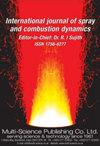Hybrid CFD/low-order modeling of thermoacoustic limit cycle oscillations in can-annular configurations
IF 2.1
4区 工程技术
Q3 ENGINEERING, MECHANICAL
International Journal of Spray and Combustion Dynamics
Pub Date : 2022-03-01
DOI:10.1177/17568277221085953
引用次数: 1
Abstract
We propose a hybrid strategy for modeling non-linear thermoacoustic phenomena, e.g. limit-cycle (LC) oscillations, in can-annular combustion systems. The suggested model structure comprises a compressible CFD simulation limited to the burner/flame zone of one single can, coupled to a low-order model (LOM) representing the remaining combustor. In order to employ the suggested strategy for modeling non-linear phenomena like LC oscillations, the LOM must capture non-linear flame dynamics in the cans, which are not resolved by CFD. Instead of identifying such non-linear flame models in preliminary simulations, we aim at learning the non-linear dynamics “on-the-fly”, while simulating the self-excited system under consideration. Based on the observation of flame dynamics in the CFD domain, the parameters of the employed non-linear models are estimated during run time. The present study reveals that block-oriented models, which comprise a linear dynamic part followed by a static non-linear function, are well suited for this purpose. The proposed hybrid model is applied to a laminar can-annular combustor. Results agree well with the monolithic CFD simulation of the entire combustor, while the computational cost is drastically reduced. The employed flame models, whose parameters are identified during the simulation of the self-excited LC oscillation, represent well the relevant non-linear dynamics of the considered flame.罐环结构中热声极限环振荡的混合CFD/低阶建模
我们提出了一种混合策略,用于模拟罐环形燃烧系统中的非线性热声现象,例如极限循环(LC)振荡。所建议的模型结构包括一个可压缩CFD模拟,该模拟仅限于一个单个罐的燃烧器/火焰区域,并耦合到表示剩余燃烧器的低阶模型(LOM)。为了采用所建议的策略来模拟LC振荡等非线性现象,LOM必须捕捉罐中的非线性火焰动力学,而CFD无法解决这些问题。我们的目标不是在初步模拟中识别这种非线性火焰模型,而是在模拟所考虑的自激系统的同时,“动态”学习非线性动力学。基于CFD领域对火焰动力学的观察,在运行期间对所采用的非线性模型的参数进行了估计。目前的研究表明,面向块的模型非常适合这一目的,该模型包括线性动态部分和静态非线性函数。将所提出的混合模型应用于层流罐环形燃烧器。结果与整个燃烧室的整体CFD模拟结果一致,同时大大降低了计算成本。所采用的火焰模型,其参数是在自激LC振荡的模拟过程中确定的,很好地代表了所考虑的火焰的相关非线性动力学。
本文章由计算机程序翻译,如有差异,请以英文原文为准。
求助全文
约1分钟内获得全文
求助全文
来源期刊

International Journal of Spray and Combustion Dynamics
THERMODYNAMICS-ENGINEERING, MECHANICAL
CiteScore
2.20
自引率
12.50%
发文量
21
审稿时长
>12 weeks
期刊介绍:
International Journal of Spray and Combustion Dynamics is a peer-reviewed open access journal on fundamental and applied research in combustion and spray dynamics. Fundamental topics include advances in understanding unsteady combustion, combustion instability and noise, flame-acoustic interaction and its active and passive control, duct acoustics...
 求助内容:
求助内容: 应助结果提醒方式:
应助结果提醒方式:


